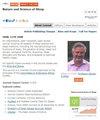The Association of High Arousal Threshold with Hypertension and Diabetes in Obstructive Sleep Apnea
IF 3
2区 医学
Q2 CLINICAL NEUROLOGY
引用次数: 0
Abstract
Objective: Compared to low arousal threshold (AT), high AT is an easily overlooked characteristic for obstructive sleep apnea (OSA) severity estimation. This study aims to evaluate the relationship between high AT, hypertension and diabetes in OSA, compared to those with apnea–hypopnea index (AHI).Methods: A total of 3400 adults diagnosed with OSA were retrospectively recruited. Propensity score matching (PSM) was conducted to further categorize these patients into the low and high AT groups based on the strategy established by previous literature. The different degrees of AHI and quantified AT (AT score) were subsequently measured. The correlation of AT and AHI with the occurrence of various comorbidities in OSA was estimated by logistic regression analysis with odds ratio (OR).
Results: After PSM, 938 pairs of patients arose. The median AT score of high and low AT group was 21.7 and 12.2 scores, and the adjusted OR of high AT for hypertension and diabetes was 1.31 (95% CI = 1.07– 1.62, P < 0.01) and 1.45 (95% CI = 1.01– 2.08, P < 0.05), respectively. Compared to low AT score group, the OR significantly increased in patients with very high AT score (30 ≤ AT score), especially for diabetes (OR = 1.79, 95% CI = 1.02– 3.13, P < 0.05). The significant association was not observed in AHI with increasing prevalent diabetes.
Conclusion: Higher AT is significantly associated with increased prevalence of hypertension and diabetes in patients with OSA. Compared with AHI, AT score is a potentially comprehensive indicator for better evaluating the relationship between OSA and related comorbidities.
Keywords: obstructive sleep apnea, arousal threshold, apnea–hypopnea index, hypertension, diabetes
阻塞性睡眠呼吸暂停患者的高唤醒阈值与高血压和糖尿病的关系
目的:与低唤醒阈值(AT)相比,高唤醒阈值是阻塞性睡眠呼吸暂停(OSA)严重程度评估中一个容易被忽视的特征。本研究旨在评估与呼吸暂停-低通气指数(AHI)相比,高唤醒阈、高血压和糖尿病与 OSA 之间的关系:方法:回顾性招募了 3400 名确诊为 OSA 的成年人。方法:共回顾性招募了 3400 名确诊为 OSA 的成人,并根据以往文献确定的策略进行倾向得分匹配(PSM),进一步将这些患者分为低 AT 组和高 AT 组。随后测量了不同程度的 AHI 和量化的 AT(AT 评分)。结果显示,在进行 PSM 分析后,938 对患者的 AT 和 AHI 与 OSA 中各种合并症的发生率之间存在相关性:结果:经过 PSM,共出现 938 对患者。高AT组和低AT组的中位AT评分分别为21.7分和12.2分,高AT组高血压和糖尿病的调整OR分别为1.31(95% CI = 1.07- 1.62,P< 0.01)和1.45(95% CI = 1.01- 2.08,P< 0.05)。与低AT评分组相比,极高AT评分(30≤AT评分)患者的OR显著增加,尤其是糖尿病患者(OR = 1.79,95% CI = 1.02- 3.13,P < 0.05)。结论:AT越高,糖尿病患病率越高:结论:在 OSA 患者中,AT 值越高,高血压和糖尿病的患病率越高。关键词:阻塞性睡眠呼吸暂停;唤醒阈值;呼吸暂停-低通气指数;高血压;糖尿病
本文章由计算机程序翻译,如有差异,请以英文原文为准。
求助全文
约1分钟内获得全文
求助全文
来源期刊

Nature and Science of Sleep
Neuroscience-Behavioral Neuroscience
CiteScore
5.70
自引率
5.90%
发文量
245
审稿时长
16 weeks
期刊介绍:
Nature and Science of Sleep is an international, peer-reviewed, open access journal covering all aspects of sleep science and sleep medicine, including the neurophysiology and functions of sleep, the genetics of sleep, sleep and society, biological rhythms, dreaming, sleep disorders and therapy, and strategies to optimize healthy sleep.
Specific topics covered in the journal include:
The functions of sleep in humans and other animals
Physiological and neurophysiological changes with sleep
The genetics of sleep and sleep differences
The neurotransmitters, receptors and pathways involved in controlling both sleep and wakefulness
Behavioral and pharmacological interventions aimed at improving sleep, and improving wakefulness
Sleep changes with development and with age
Sleep and reproduction (e.g., changes across the menstrual cycle, with pregnancy and menopause)
The science and nature of dreams
Sleep disorders
Impact of sleep and sleep disorders on health, daytime function and quality of life
Sleep problems secondary to clinical disorders
Interaction of society with sleep (e.g., consequences of shift work, occupational health, public health)
The microbiome and sleep
Chronotherapy
Impact of circadian rhythms on sleep, physiology, cognition and health
Mechanisms controlling circadian rhythms, centrally and peripherally
Impact of circadian rhythm disruptions (including night shift work, jet lag and social jet lag) on sleep, physiology, cognition and health
Behavioral and pharmacological interventions aimed at reducing adverse effects of circadian-related sleep disruption
Assessment of technologies and biomarkers for measuring sleep and/or circadian rhythms
Epigenetic markers of sleep or circadian disruption.
 求助内容:
求助内容: 应助结果提醒方式:
应助结果提醒方式:


